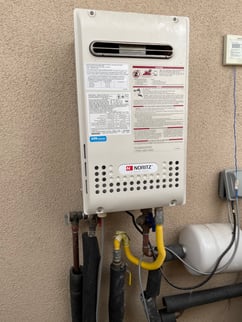Do you recommend tankless water heaters?
We strongly advise against tankless water heaters. Here are the tradeoffs and considerations for tankless water heaters.
You may have heard that tankless, or instant, water heaters are more eco-friendly than water heaters with a tank.
While tankless water heaters do save water, they're worse overall for the environment because they are much less energy efficient.
QuitCarbon provides free, expert guidance on the best equipment options for your home. Start your home assessment here to see our recommendations and book a free call with our friendly home upgrade coaches!
Keep reading for the top tradeoffs to consider when evaluating tankless water heaters.
 Photo of a gas tankless water heater (which we do not recommend!)
Photo of a gas tankless water heater (which we do not recommend!)
Pros and cons of tankless water heaters
Advantages of tankless water heaters:
- Flexible locations, because they can be very small (and, for example, fit under a sink).
- Don't require a large tank in the garage.
- Sometimes they're an easy installation - no venting, no condensate, just electricity in, cold water in, and hot water out
- Silent operation.
Disadvantages of tankless water heaters:
- Gas tankless water heaters release more climate-warming unburned methane and are worse for our planet than tank-style gas water heaters.
- Electric tankless water heaters require enormous amounts of power (100+ amps) and are expensive to operate. Since tankless water heaters are 3-4 times less efficient than a heat pump water heater with a tank, they use WAY more electricity, and thus cost more, for a given amount of hot water.
- If they have high capacity (eg. they heat water for the whole house, rather than just one sink) then they need a LOT of electrical capacity - large (expensive) wires, and lots of amperage - which can trigger the need for electrical panel and service upgrades, which can cost thousands.
Heat Pump Water Heaters - our recommended choice

QuitCarbon is an ENERGY STAR Partner that can help you get an efficient, money-saving water heater for your home.
Heat pump water heaters, our recommended choice for most homes, do have some requirements to be aware of.
QuitCarbon helps you plan for these considerations:
- They require a tank — make sure there’s room in your design. In mild climates, they can be located outdoors in a small protective shed.
- They require airflow. Garages, basements, and utility rooms that are at least 7x10x10 offer enough air. If in a smaller space, they may need to be ducted to the outdoors.
- They make some sound when running, so plan to locate away from bedrooms and sensitive living spaces, or add sound insulation. However, this noise is very rarely bothersome for heat pump water heater owners.
- Split systems are available with an outdoor heat pump that is plumbed to an indoor storage tank. This can help with space and sound concerns, but they are more expensive.
You have several options of where to place your heat pump water heater if it won't fit inside your home. Click here to read more.
What's the best water heater for your home?
If this all sounds complicated, don't worry - you're not on your own!
As part of our free service, QuitCarbon helps you understand if a heat pump water heater is right for your home.
Our friendly experts are happy to discuss equipment options, estimate project pricing, help maximize your cost savings and rebates, and connect you with a vetted contractor near you.
You can read more about these systems in our comprehensive guide to heat pump water heaters.
Click here to get free guidance for your home!
